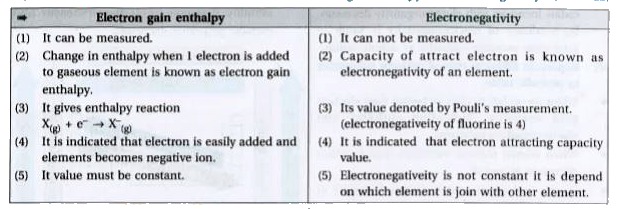What is the basic difference the terms electron gain enthalpy and electronegativity ?
Text Solution
|
Topper's Solved these Questions
- CLASSIFICATION OF ELEMENTS AND PERIODICITY IN PROPERTIES BOOK - KUMAR PRAKASHANCHAPTER - CLASSIFICATION OF ELEMENTS AND PERIODICITY IN PROPERTIES EXERCISE - Section -B
103 Videos
- CLASSIFICATION OF ELEMENTS AND PERIODICITY IN PROPERTIES BOOK - KUMAR PRAKASHANCHAPTER - CLASSIFICATION OF ELEMENTS AND PERIODICITY IN PROPERTIES EXERCISE - Section -C (MCQs from Textual Exercise )
8 Videos
- CLASSIFICATION OF ELEMENTS AND PERIODICITY IN PROPERTIES BOOK - KUMAR PRAKASHANCHAPTER - CLASSIFICATION OF ELEMENTS AND PERIODICITY IN PROPERTIES EXERCISE - Section -A -
1 Videos
- CHEMICAL BONDING AND MOLECULAR STRUCTUREBOOK - KUMAR PRAKASHANCHAPTER - CHEMICAL BONDING AND MOLECULAR STRUCTUREEXERCISE - SECTION -D (SOLUTIONS OF NCERT EXEMPLAR PROBLEMS) (LONG ANSWER TYPE QUESTIONS)
10 Videos
- ENVIRONMENT CHEMISTRY BOOK - KUMAR PRAKASHANCHAPTER - ENVIRONMENT CHEMISTRY EXERCISE - Question For Module (Section-C)
1 Videos
Similar Questions
Knowledge Check
Second electron gain enthalpy:
Ais always negativeBis always positiveCcan be positive or negativeDis always zeroWhich of the following is affected by the stable electron configuration of an atom?
(a) Electronegativity (b) ionisation enthalpy (c ) Electron gain enthalpy
Correct answer is:AOnly electronegativityBonly ionisation enthalpyCboth electron gain enthalpy and ionisation enthalpyDall of the above
What is the basic difference between the terms electron gain enthalpy and electronegativity?
View SolutionWhat is the basic difference between the terms electron gain enthalpy and electronegativity?
View SolutionWhat is the basic difference between electronegativity and electron gain enthalpy ?
View SolutionExplain the terms ionization enthalpy and electron gain enthalpy.
View SolutionWhat is the electron gain enthalpy for noble gases?
View SolutionWhich of the following is affected by the stable electron configuration of an atom?
(a) Electronegativity (b) ionisation enthalpy (c ) Electron gain enthalpy
Correct answer is:
View Solution

